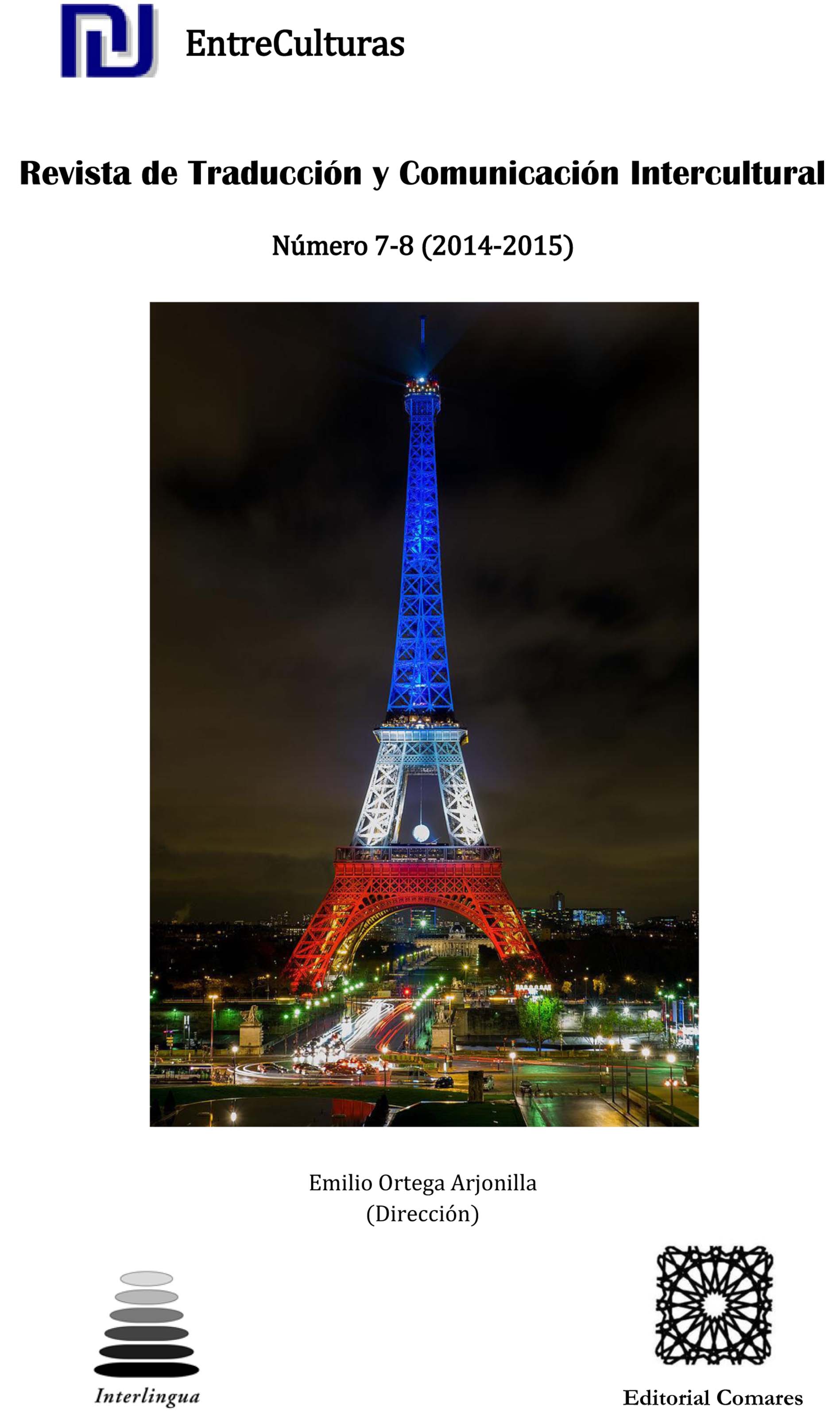ANÁLISIS DE LA TRADUCCIÓN DEL VIDEOJUEGO TO THE MOON POR PARTE DE FANS
DOI:
https://doi.org/10.24310/Entreculturasertci.vi7-8.11362Keywords:
localisation, audiovisual translation, video games, transcreation, amateur translation, fans, cultural references, swearwords, euphemism, linguistic variation, humourAbstract
This article will analyse the special case of the PC video game To the moon and the whole new world it creates for the sector. To the moon has only been sold online, may that be the reason or not, the different translations of the game have been made by fans. Therefor, we will look into the different difficulties that this video game translation presents: cultural references, linguistic variation, euphemism, swearwords and humour. This way, we will have a clear image of how fans solved these problems and if they actually did it succesfully.
Downloads
Metrics
References
BIBLIOGRAFÍA PRIMARIA
Freebird Games (2015). To the moon. [Internet] Disponible en: http://freebirdgames.com/to_the_moon/#download [Acceso el 21 de marzo de 2015].
Let's Play Archive (2014). To the Moon by Roar. [Internet] Disponible en: http://lparchive.org/To-The-Moon/Update%2001/ [Acceso el 21 de marzo de 2015].
Youtube (2015). Alexelcapo. [Internet] Disponible en: https://www.youtube.com/user/alexelcapo/search?query=to+the+moon [Acceso el 21 de marzo de 2015].
BIBLIOGRAFÍA SECUNDARIA
Barreras, P. (2003). "Localización de videojuegos" en MeriStation. 24 de noviembre de 2003. Disponible en: <http://www.meristation.com/pc/reportaje/localizacion-devideojuegos/1601463> [Acceso el 21 de marzo de 2015].
BBC (2006). Dr Who 'longest running sci-fi'. [Internet] Disponible en: http://news.bbc.co.uk/2/hi/entertainment/5390372.stm [Acceso el 21 de marzo de 2015].
Bernal-Merino, M. Á. (2007). "Challenges in the translation of video games" en Revista Tradumática. Noviembre de 2007. Disponible en: http://www.fti.uab.es/tradumatica/revista/num5/articles/02/02art.htm[Acceso el 21 de marzo de 2015].
Bernal-Merino, M. Á. (2014). Translation and Localisation in Video Games. Making Entertaining Software Global. Londres: Routledge. [Internet] Disponible en: http://books.google.es/books?id=Z4aQBAAAQBAJ&pg=PT382&lpg=P T382&dq=fun+vs+offensive+kate+edwards&source=bl&ots=VnYiW_ScjQ&sig=vnh0MxqiuPWLB1VmaSF5bbp4E0k&hl=es&sa=X&ei=YjEpVO2FNZbnatvFgJgH&ved=0CDEQ6AEwAg#v=onepage&q&f=false [Acceso el 21 de marzo de 2015].
Bernal-Merino, M.Á. (2007). "Localisation and the cultural concept of play in games" en Localization World Conference, Seattle 17-18 de octubre de 2007. [Internet] Disponible en: http://www.localizationworld.com/lwseattle2007/downloads/LocalisationAndGames.pdf [Acceso el 21 de marzo de 2015].
César del Amo, I. (pendiente de publicación). "Traducción y subtitulación del humor: el caso de The Catherine Tate Show" en Revista Linguae.
Centro Virtual Cervantes (2015). Variedad lingu?ística. [Internet] Disponible en: http://cvc.cervantes.es/ensenanza/biblioteca_ele/diccio_ele/diccionario/ variedadlinguistica.htm [Acceso el 21 de marzo de 2015]. eldoblaje.com (2015) Ficha El castillo en el cielo. [Internet] Disponible en: http://www.eldoblaje.com/datos/FichaPelicula.asp?id=21884 [Acceso el 22 de marzo de 2015].
Hurtado de Mendoza Azaola, I., (2009). "Translating proper names into Spanish: The case of Forest Gump" en Díaz Cintas, J. (ed.), New Trends in Audiovisual Translation. Great Britain: Multilingual Matters, pp. 70-82.
Loureiro Pernas, M. (2007). "Paseo por la localización de un videojuego" en Revista Tradumática. Noviembre de 2007. Disponible en: http://webs2002.uab.es/tradumatica/revista/num5/articles/03/03.pdf [Acceso el 21 de marzo de 2015].
Mangiron, C. (2006). "Video Games Localisation: Posing New Challenges to the Translator" en Perspectives: Studies in Translatology. Disponible en: http://www.academia.edu/6914885/Game_Localisation_Posing_New_Challenges_to_the_Translator [Acceso el 22 de marzo de 2015].
Mangiron, C., O'Hagan, M., (2006). "Game Localisation: Unleashing Imagination with 'Restricted' Translation" en Jostrans. Julio de 2006. Disponible en: http://www.jostrans.org/issue06/art_ohagan.php [Acceso el 21 de marzo de 2015].
Muñoz Sánchez, P. (2011). Investigar en localización de videojuegos: una realidad presente y una apuesta de futuro. [Internet] Disponible en: http://www.academia.edu/3277503/Investigar_en_localizaci%C3%B3n_de_videojuegos_una_realidad_presente_y_una_apuesta_de_futuro [Acceso el 22 de marzo de 2015].
Samaniego Fernández, E., Fernández Fuertes, R. (2002). "La variación lingu?ística en los estudios de traducción" en Epos, pp. 325-342. [Internet] Disponible en: http://espacio. uned.es/fez/eserv.php?pid=bibliuned:Epos-698860FB-A441-5DF3- 8E5D-A603A2AB8166&dsID=Documento.pdf [Acceso el 22 de marzo de 015].
Scholand, M. (2002). "Localización de videojuegos" en Revista Tradumática. Octubre de 2002. Disponible en: http://www.fti.uab.es/tradumatica/revista/articles/mscholand/art.htm [Acceso el 21 de marzo de 2015].
Downloads
Published
How to Cite
Issue
Section
License
All contents published in Entre culturas. Revista de traducción y comunicación intercultural are protected under the Creative Commons Attribution-NonCommercial-ShareAlike 4.0 International (CC BY-NC-SA 4.0) license. All about this license is available in the following link: <http://creativecommons.org/licenses/by-nc-sa/4.0>
Users can copy, use, redistribute, share and exhibit publicly as long as:
- The original source and authorship of the material are cited (Journal, Publisher and URL of the work).
- It is not used for comercial purposes.
- The existence of the license and its especifications are mentioned.
There are two sets of authors’ rights: moral and property rights. Moral rights are perpetual prerogatives, unrenounceable, not-transferable, unalienable, imprescriptible and inembargable. According to authors’ rights legislation, Entreculturas. Revista de traducción y comunicación intercultural recognizes and respects authors moral rights, as well as the ownership of property rights, which will be transferred to University of Malaga in open access. The property rights are referred to the benefits that are gained by the use or the dissemination of works. Entreculturas. Revista de traducción y comunicación intercultural is published in an open access form and it is exclusively licenced by any means for doing or authorising distribution, dissemination, reproduction, , adaptation, translation or arrangement of works.
Authors are responsable for obtaining the necessary permission to use copyrighted images.





7.png)
